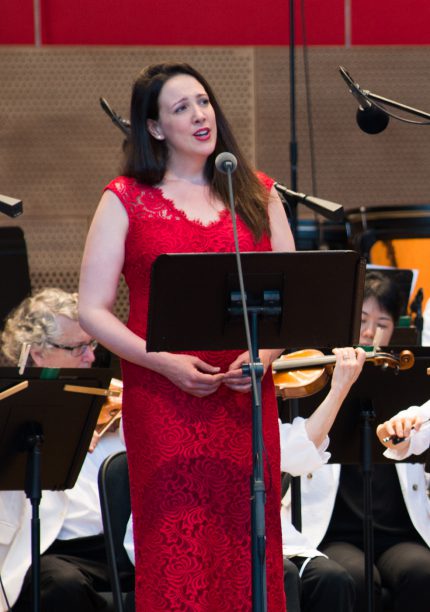Phillips shines in Copland song cycle with the Grant Park Orchestra

One of the most heartening elements of the Grant Park Music Festival over its eight-decade history has been the lakefront concerts’ abiding commitment to American composers, past and present.
Aaron Copland, the most esteemed of homegrown 20th century voices, was represented Wednesday night with his Eight Poems of Emily Dickinson, performed by Susanna Phillips at the Pritzker Pavilion.
Apart from his opera The Tender Land, Copland wrote few vocal works. But Twelve Poems of Emily Dickinson is among his finest inspirations, showing close understanding of the poetic texts, his music wrapping around Dickinson’s stanzas with graceful ease. The composer later recast his 1950 song cycle, cutting four songs and arranging the piano accompaniment for chamber orchestra, which was the version performed Wednesday.
Phillips provided sterling advocacy for this more concise, revised version. Singing with immaculate diction and luminous tone, the Alabama native showed complete sympathy with the idiom, approaching these settings with lieder-like polish yet with the ease and simplicity of a 19th century American parlor ballad.
The soprano conveyed the rumination of “Nature, the gentlest mother,” as surely as the romantic regret of “Heart, we will forget him,” set against the cheerful expression of “Dear March, come in!” and the whimsical “Going to Heaven!”
She was also technically assured throughout, as in the high tessitura of “Sleep is supposed to be.” The more interior settings were especially fine, with Phillips conveying the forlorn spareness of “The world feels dusty” and closing with a subdued and elegiac take on “The Chariot,” the last and finest song of the cycle.
Carlos Kalmar and the Grant Park Orchestra were sympathetic partners throughout, conveying the gentle, pastel shadings of Copland’s scoring.
Most of Wagner’s symphonic concert music consists of preludes and excerpts from his operas. A rare exception is A Faust Overture, a stand-alone orchestral work, written in 1840. This Goethe-inspired early effort is not prime Wagner, episodic in structure with less-than-indelible material, yet Kalmar and the orchestra provided the best possible case. From the dark, brooding lower strings of the opening, Kalmar led a spacious, concentrated reading that found surprising depth and elqouence in this uneven score.
The festival’s artistic director has been engaged in a gradual Beethoven cycle in recent seasons. The epic Ninth Symphony will feature on this summer’s closing weekend in August and Beethoven’s Symphony No. 4 wrapped the evening Wednesday night.
Kalmar distilled a fine sense of mystery in the introduction, ensuring contrast with the Haydenesque high spirits of the ensuing Allegro. The lyric lines of the Adagio were skillfully sustained although the music night have registered more effectively at a less impatient tempo. A vibrant Menuetto and snappy finale provided a suitably energetic close to the evening.
Carlos Kalmar leads the Grant Park Orchestra in Stravinsky’s The Firebird (complete), David Schiff’s Infernal, and Khachaturian’s Piano Concerto with soloist Conrad Tao 6:30 p.m. Friday and 7:30 p.m. Saturday at the Pritzker Pavilion. gpmf.org
Posted in Performances




